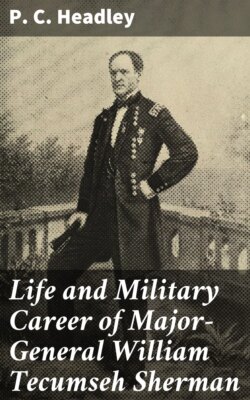Читать книгу Life and Military Career of Major-General William Tecumseh Sherman - P. C. Headley - Страница 5
На сайте Литреса книга снята с продажи.
CHAPTER II.
ОглавлениеTable of Contents
The Eventful Call—“Cump” in the Sandbank—The Unexpected Summons—He obeys—His new Home—School days—A Studious and Reliable Boy—Is appointed Cadet—Leaves Home for West Point—His Life in the Academy—Graduates and goes to Florida.
“
OTHER, may I go and play in the sand?” said a bright boy one day, cap in hand, ready to bound into the open air. Almost before the expected “yes” had ceased to echo in the room, “Cump,” as he was familiarly called, hastened to a bank in which excavations had been made, and the sand taken away. He was soon “busy as a bee,” throwing up miniature fortifications and heaps in various forms, after the models of his own juvenile invention.
Meanwhile the distinguished Hon. Thomas Ewing, now the venerable representative of the statesmen of the past, a resident of Lancaster, entered the widowed mother’s dwelling. He knew that the benevolent and departed father had not left her large family a fortune. It would therefore be no easy task to educate and start them in the world. And his errand there was to ask her to commit one of the boys to his home and care. He said, with a playful earnestness, “I must have the smartest of the lot; I will take no other, and you must select him for me.” After a short consultation between the mother and eldest daughter, the choice fell upon “Cump.” So it was decided that Mr. Ewing should take him to his house and educate him with his own children.
Leaving the mother and sister saddened with the prospect of parting with the boy, he went to the sandbank, where we just now left William at play. “Come, my boy,” said the unexpected visitor, “you are going to live with me. I have seen your mother; she has given her consent.”
The astonished little worker listened, and looked a moment at his benefactor, then straightened up, brushed off the sand, and started after him. That night he went to his bed in his new and beautiful home with strange thoughts, and a shadow upon his young spirit. He had left mother and the home of his childhood for life; only as an occasional visitor. It was a crisis in his history, and one which decided in the result his brilliant martial career. The public schools, which are now the pride of our land, were not then known in Ohio. But Lancaster could boast a good academy, and into its English department Tecumseh was entered as a pupil. He had reached his ninth year, and soon convinced his teacher and companions that he could take a high rank among the boy-students of his age.
Mr. Ewing assured me that there was nothing remarkable or eccentric in his experience during the years that followed, excepting his executive ability in little matters of business committed to him. He “never knew so young a boy who would do an errand so correctly and promptly as he did. He was transparently honest, faithful, and reliable. Studious and correct in his habits, his progress in education was steady and substantial.” At the age of sixteen, Mr. Ewing, in his official position, had at his disposal the appointment of a cadet to the Military Academy at West Point, and determined to offer it to his “protégé.” Tecumseh had a taste for military life, and of course gladly accepted the honor.
Before we follow him to that institution we will take another glimpse of the home of his adoption. Mrs. Ewing was a highly intelligent lady, a member of the Roman Catholic Church, and had the privilege of educating her children in her own faith. Her daughter Ellen was at this time an attractive girl of nearly the same age of Tecumseh. For half a dozen of life’s most careless, happy years, they had been to school, talked and played together. And it is not strange that among the friends he left behind him, when he turned the second time from home, and now for a distant abode among strangers, that to part with her should be no common trial for his young and manly heart. But he had entered for himself
“Upon life’s broad field of battle,”
and hastened to the ordeal of examination for admission to the academy. The bright day of trial has come. Look in upon the spacious hall where the Examining Board and distinguished visitors have gathered, to see and hear what the young candidates for freshman honors may know. Now listen; young Sherman’s name is called. He is modest, yet perfectly self-possessed. After answering a test question with remarkable propriety and dignity, a professor remarked: “He is a blooded fellow!” that is, he was of good blood—had the ingrained qualities of manliness, and the promise of honorable distinction. This was in the summer of 1836. He advanced from class to class, mastering the studies in the course, and maintaining a high reputation in all his relations to the officers and students of the academy. He was quite at home in artillery, which you know is the handling of heavy guns; and in the saddle at the riding school of the institution. He graduated fifth in his class June 30th, 1840. The rebel General Beauregard was a classmate.
You have learned that, as a man, he loses no time in his military movements. Created second lieutenant in the Third Artillery, he repaired to Florida in the service of the regular army. When the autumnal leaves rustled in the war-path, he was fairly in the ranks and under the old flag, which he was destined to honor so well, and with whose stars his name would shine while it floats over the land of his birth.
